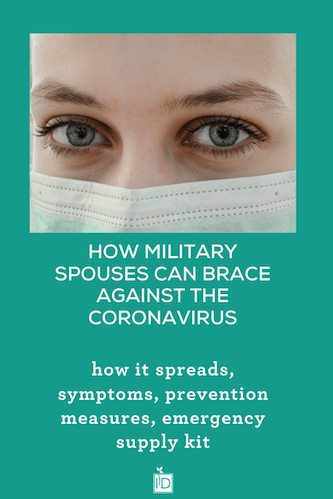“It’s not a question of if but rather a question of when and how many people in this country will have severe illness.” ~Nancy Messonnier, director of the CDC’s National Center for Immunization and Respiratory Diseases
Concern about the coronavirus is increasing among military families stationed in South Korea, Europe, and Hawaii. As military families, we’re used to dealing with difficult and dangerous situations, and we know that it always feels better to do something rather than sitting by and worrying, so let’s prepare for the worst and hope for the best.
How the coronavirus is affecting U.S. military families this week
On Monday, a U.S. Forces dependent at Camp Walker in Daegu, South Korea tested positive and U.S. Forces Korea bumped their health protection condition up to Charlie, the second highest level. In Vicenza, Italy, the garrison closed public places including installation schools, the child development centers, fitness facilities, and churches through March 1. On Tuesday, U.S. Army Europe was bracing for lockdown or restricted movement in Germany and on Wednesday Germany’s health minister acknowledged that they’re headed for an epidemic because they have new cases that they can’t trace to the original source in China. The state is urging residents in Hawaii to have a fourteen-day kit of emergency supplies at home. Here in the United States, Nancy Messonnier, the director of the CDC’s National Center for Immunization and Respiratory Diseases told reporters, “It’s not a question of if but rather a question of when and how many people in this country will have severe illness.”
Because of supply shortages military spouses abroad are seeing, and the rapidity at which the virus is spreading, it wouldn’t hurt to get prepared regardless of how many cases there are within our proximity. We can get prepared by understanding how coronavirus spreads, recognizing symptoms, taking prevention measures, and putting together a fourteen-day emergency supply kit. If you live in hurricane country, you might already have a good start on getting your kit together.
How coronavirus spreads
The coronavirus is especially concerning because it can be transmitted by people with no symptoms, though people are thought to be most contagious when they are the sickest. According to the Centers for Disease Control and Prevention, the virus is spread mainly from person-to-person through coughs or sneezes when they’re within six feet of each other. It might be possible to contract the coronavirus by touching something that has the virus on it and then touching mouth, nose, or eyes.
Symptoms of coronavirus
According to the CDC, symptoms can include:
· Fever
· Cough
· Shortness of breath
Prevention measures for coronavirus
The CDC offers the following measures you can take to avoid contracting the coronavirus:
· Avoid close contact with sick people
· Avoid touching your eyes, nose, and mouth
· Stay home when you’re sick
· Cover coughs and sneezes with a tissue and immediately throw the tissue away
· Clean and disinfect things you touch
· Wear a facemask if you’re showing symptoms, you’re a health worker, or you’re taking care of sick people at home. If you’re interested in purchasing a mask, Erin Murray, a military spouse stationed in South Korea recommended the Vog Mask in one of her Instagram Stories. They’re sold out, but new inventory is coming in on March 4.
· Wash your hands often with soap and water for at least twenty seconds after using the restroom, before eating, after blowing your nose, coughing, or sneezing
· If you can’t wash your hands, use hand sanitizer containing at least 60 percent alcohol
· Follow these guidelines if you’re traveling
Ideas for 14-day emergency supply kit
Ask yourself what you’d like to have on hand if you had to quarantine in your house for a couple of weeks and somebody might not be feeling well. It’s also good to stock up on necessities in case of disruptions in supplies.
· Water and beverages you like to have on hand when you’re sick
· Nonperishable food including foods you like to have when you’re sick
· Immunity-boosting supplements if you use them
· Cold/flu medications and pain relievers
· Cleaning supplies including sturdy garbage bags
· Toiletries and personal hygiene items
· Baby supplies like diapers, wipes and formula
· Pet care items
· Entertainment items like toys, books, and games
· 3 months of medications + copy of your prescriptions
This is a rapidly developing situation that is changing by the hour. If you Google “coronavirus,” the top stories have been featuring live updates from major news outlets, so that’s a great place to look for recent news. Please pay attention to the guidance you’re receiving in your area and take precautions to keep you and your family healthy and well. That includes coming up with a family plan of what you’re going to do if one of you falls ill. Let’s get ready and hope that we can use up our emergency supplies in good health. Stay well friends!
How Military Spouses Can Brace Against the Coronavirus
ABOUT KIMBERLY AND SARAH
Kimberly Bacso exchanged an office with a view for a life of adventure when she became a military spouse in 2001. She is the co-founder and operations director of InDependent, a non-profit on a mission to make wellness accessible to all military spouses. She is the managing editor of Legacy Magazine, a print publication celebrating service member families and the communities that support them. Kimberly holds a Masters in Business Administration degree, is an experienced registered yoga teacher and a lifelong vegetarian who can often be found traveling off the beaten path with her husband and teenage daughter.
Sarah Shiozawa is a program manager at InDependent. She began her professional career working in Washington D.C. as a consultant with Homeland Security and a staffer in the U.S. Senate. She holds certifications in program management. Sarah loves marathon training, tennis, and high fitness. Travel is a deep passion, and she loves to explore new destinations domestically and internationally. Sarah married her high school sweetheart and solider ten years after graduation. As a mom of three kiddos under three, she started juicing and eating a plant-based lifestyle. Sarah’s wellness journey transformed her from the inside out. She loves to interact with the InDependent community and connect with other military spouses.













